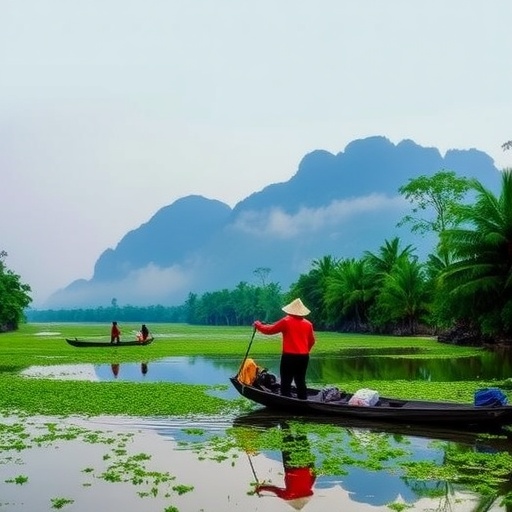In recent years, the significance of corporate social responsibility (CSR) has permeated various sectors, but nowhere is its impact more crucial than in the realm of sustainable tourism. A groundbreaking study conducted by Nguyen, Dang, and Thi Cam delves into the intricacies of how CSR initiatives influence sustainable tourism development specifically in the picturesque tourist destinations of the Mekong Delta. This research is particularly timely, taking into account the pressing challenges faced by the tourism industry in balancing growth with ecological and social sustainability.
The Mekong Delta, a vibrant region known for its lush landscapes and rich cultural heritage, has become a focal point in discussions surrounding sustainable tourism. However, the growing influx of tourists puts immense pressure on local resources and ecosystems. The researchers underscore that effective CSR strategies can help mitigate these pressures by promoting responsible business practices among tourism operators. Their findings highlight that when companies adopt CSR initiatives, there is a notable improvement in community relations, environmental conservation efforts, and overall tourist satisfaction.
The study reveals that exemplary CSR practices not only empower local communities but also enhance the tourism experience. For instance, tourism businesses that invest in local infrastructure, support cultural preservation, and engage in environmental stewardship see tangible benefits in visitor numbers and satisfaction. This phenomenon underscores a transformative cycle—effective CSR leads to improved community relations, which, in turn, attracts more tourists, creating a win-win scenario for all stakeholders involved.
Furthermore, the researchers explored the role of consumer awareness in shaping the landscape of CSR in tourism. As travelers become more conscious of their environmental and social footprints, there is a marked shift in their preferences toward companies that exhibit strong CSR commitments. This changing consumer behavior pressures tourism operators to elevate their CSR efforts, thereby instilling a corporate culture that prioritizes sustainability. Thus, the study suggests that businesses that recognize and adapt to this trend are likely to achieve long-term viability in an increasingly competitive market.
The research also emphasizes the importance of collaboration among various stakeholders in the tourism industry. Tourism operators, government agencies, and local communities must work hand in hand to develop and implement effective CSR strategies. By creating partnerships that leverage each stakeholder’s strengths, a comprehensive approach to sustainable tourism development can emerge. This collaborative model not only fosters innovation but also enables the diversification of tourism offerings, ensuring that the unique attributes of the Mekong Delta are preserved for future generations.
Moreover, the study addresses the need for regulatory frameworks that support CSR initiatives in tourism. Implementing policies that encourage transparency and accountability among businesses can create an environment where CSR thrives. The researchers advocate for governments to play a more active role in incentivizing sustainable practices, such as tax breaks for environmentally friendly companies or grants for community engagement projects. Such measures can catalyze a cultural shift within the tourism sector toward more responsible practices.
Another poignant aspect of the research highlights the need for businesses to engage in ongoing education about CSR. Stakeholders, including employees, management, and the local community, should be well-versed in the principles and benefits of corporate social responsibility. This education can facilitate a robust understanding of sustainable practices and encourage active participation from all parties, thus fostering a shared commitment to the region’s ecological and cultural preservation.
Furthermore, the study reveals that monitoring and measuring the impact of CSR initiatives is essential for ensuring their effectiveness. The researchers suggest that tourism operators implement robust assessment mechanisms that can evaluate the outcomes of various CSR projects. By tracking progress and gathering insights, businesses can refine their strategies, share success stories, and inspire others within the industry to adopt similar practices.
The implications of the research extend beyond theoretical frameworks; they resonate with the broader global movement toward sustainable development. As tourism continues to evolve, stakeholders must recognize that the path forward relies heavily on integrating CSR into core business operations. The Mekong Delta serves as both a case study and a model for other regions grappling with the complexities of balancing tourism growth with ecological preservation.
In conclusion, the research conducted by Nguyen, Dang, and Thi Cam shines a light on the profound potential that CSR holds for fostering sustainable tourism in the Mekong Delta. The findings not only underscore the importance of responsible business practices but also illustrate the interconnectedness of community well-being, environmental stewardship, and successful tourism. As we navigate the challenges of the 21st century, innovative CSR initiatives will undoubtedly play a pivotal role in shaping the future of the tourism industry, ensuring that places like the Mekong Delta can thrive while maintaining their unique identity for generations to come.
By collectively embracing these principles, the tourism industry can create a sustainable future that benefits everyone involved, from local communities to visitors alike. The integration of CSR into tourism practices does not merely represent a trend; it signifies a major shift towards a more responsible and equitable approach to travel that enhances the experience of all stakeholders. Through collaborative efforts, continuous education, and effective policy-making, the Mekong Delta can emerge as a leading example of sustainable tourism—a blueprint that can be replicated across the globe.
Subject of Research: The impact of corporate social responsibility on sustainable tourism development at tourist destinations in the Mekong Delta.
Article Title: The impact of corporate social responsibility on sustainable tourism development at tourist destinations in the Mekong Delta.
Article References:
Nguyen, M.T., Dang, T.V., Thi Cam, V. et al. The impact of corporate social responsibility on sustainable tourism development at tourist destinations in the Mekong Delta. Discov Sustain 6, 1097 (2025). https://doi.org/10.1007/s43621-025-01975-3
Image Credits: AI Generated
DOI:
Keywords: Corporate Social Responsibility, Sustainable Tourism, Mekong Delta, Community Engagement, Environmental Stewardship.




